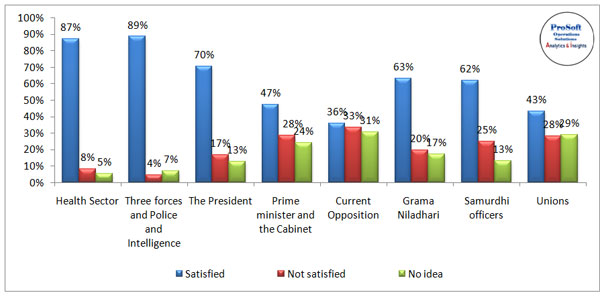News
Recovering from the COVID pandemic – What to expect
View(s):By Dr Janaki Kuruppu Chairperson of Mother Sri Lanka Trust, former Chairperson – Sri Lanka Tea board, former Chairperson – Regional Development Bank, Group Director – Cargills Group and first MD – Nielsen Lanka The Survey was conducted by Prosoft Operations (Pvt) Ltd
Recovering from Covid 19 Pandemic – What to Expect
A research on the people’s mindset and the expectations for economic recovery in the aftermath of Covid 19 pandemic was conducted island-wide during the week ending May 15th, 2020. The survey was conducted in an on-line interview and telephone interview format and included 750 responses covering all 9 provinces. The survey was conducted by Pro Soft Operations (Pvt) Ltd on behalf of the writer Dr Janaki Kuruppu. The information areas that the survey covered can be mainly clubbed into two main areas: the issues that people faced during the lockdown and the issues they anticipate when returning to normalcy both from an economic and occupation perspective and a personal life perspective. We see that the findings of this study will give very valuable insights for decision makers in the government and businesses to understand and prepare for the next immediate stages of this crisis.
Recovering from Post Covid 19 Lockdown: Expectations of People
When the country tries to return to normal, what would be the most important things that you would want the government to do to get your family’s economic status back to normal?

Overall, the most requested help by far from the government is to reduce the cost of living which is requested by 56% of the people, followed by the request to improve health systems and help to sustain their financial status by relief on loan payments, protecting MSME’s coming as the second and third most requested supports.
When the same response is analyzed by the respondent’s income level it is seen that the highest requested support from the government across all income groups is ‘To reduce the Cost of Living’. Hence, it is paramount that the government addresses this issue immediately in order to help the people to overcome this economic crisis. The other notable findings are that the highest percentage of requests for improving the health system is from the upper middle class segment which is the group that may not like to patronize the government hospitals, but also find the private health services are very expensive. Where as the requests for handouts and for more financial support through more loans is coming from the low income class and the requests for protecting SMEs and loan moratoriums are coming from the high income classes as expected.
Support Requested from the Government By Income group:

Readiness to come out of Curfew
Do you think we have controlled the spread of the Corona disease in the Country; it is ok to lift the curfew for people to go back to their day to activities?

It is seen that even though by the time this survey was done (which was upto May 15th), the people of the country have been under curfew for almost 55 days, 66% of the people believe that lifting of curfew should be done in a staggered manner a few days at a time, while another 31% believe that the curfew should not be lifted immediately.
Expected Recovery Periods for Various Industry Sectors
A question was asked from the people as to when they will be ready to patronize different types of interactive consumer services once the curfew and the lockdown is lifted, to which the responses were that people are ready to visit their banks immediately after curfew lifted, followed by temples and churches and barber salons and beauty parlours. Whether this indicates the need based or priority based choices of our people or whether this is a result of the perceived risk of visiting these places, is for the reader to interpret and ponder.
The key learning from this information is that the banks, religious places and barber salon’s should see a return to normalcy in terms of customer visits within 3 months, while the schools, tuition classes and restaurants is likely to take up to 3-6 months, and parks, hotels, local tourism and large scale crowd gathering events and cinemas may take up to more than 6 months to see the previous levels of footfall. However, this is not an indication whether the income of these places will return to normal during these time frames since the consumer even though visiting the places may not spend the same amount as before.
When the curfew is lifted, when do you plan to obtain the following services?

Job Security by Sector
Due to the economic impact of the pandemic on almost all industries, it is expected that there will be many closures of companies, layoffs and salary cuts etc. Further, this will depend on the industry type since all industries are not affected in the same manner.The results show that it is only 38% that is sure of not losing their job or business, while another 16% also do not think there is a risk. However, the 11% who is at high risk of losing their employment and the 22% that is sure of a reduced income in the least is definitely going to be a significant burden for the country’s economy going forward.
The analysis of the job security by employment sector shows some significant findings. The highest job security is around 45-55% and is seen in sectors such as Banking/ Finance, Education, Media and Health, while the lowest job security is in garments and tourism industries as expected. However, what is significant is that 8% of those employed in the garment industry and 4% of those in the tourism industry have already lost their jobs. One can apply these percentages to the total number of employees in each sector and project the estimated rise in unemployment post this crisis. Further, a significant percentage of 54% professionals who are employed in an individual professional practice say that their income will drastically reduce, followed by 37% in trading and 36% in travel industry who say that their incomes will drastically reduce.

Job Security by Sector

Alternative Plans for Potential Job Loss

While the government will have to plan to protect the vulnerable jobs, it will help the government to see how many are already pro-actively making alternative plans. It is noteworthy that 21% are determined to find another job, 14% are planning to start their own business and 10% plan to get plan to get into agriculture. The 16% with no alternative plans is a cause for concern.
Citizens Confidence Index

With reference to the Citizens confidence as to the recovery to normal for different aspects of their lives, it is seen that the least confidence is in the income and business environment returning back to normal, while the highest confidence is in the health and safety followed by education.
POLITICAL FRONT
PEOPLE ARE NOT INTERESTED IN ANY NEW PARLIAMENT RIGHT NOW AND THEY ARE HAPPY WITH THE WAY THE COUNTRY IS BEING RUN BY THE PRESDIENT AND THE PRIME MINISTER WITH THE INTERIM CABINET
The political questions have been analysed at all island level as well as for North and East provinces vs the other provinces to see if there are significant differences in the opinions.

Only 6% of the people believe unconditionally that the election should be held in June, 2020 followed by a 22% who says its ok to hold the election in June if the President cannot run the country without the parliament. However, a significant 58% believe that the election should be postponed by a few months and/or until the Covid 19 crisis is over. An interesting finding is that 14% say that we do not need the parliament at all!
North & East
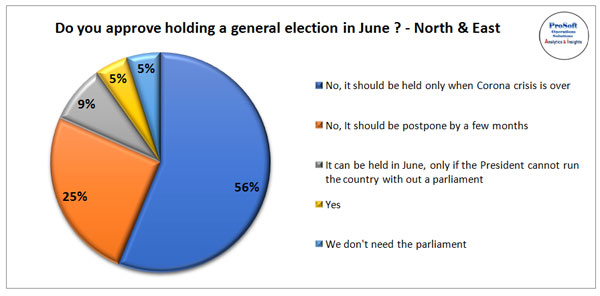
Rest of the Country (Except North & East)
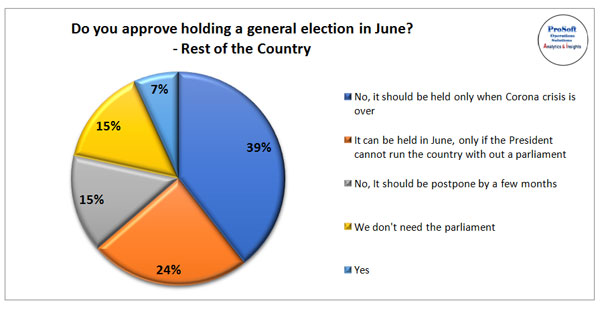
Overall, there is less preference in the North and East for a general election in June and also more preference for recalling the old parliament as compared to the rest of the country.
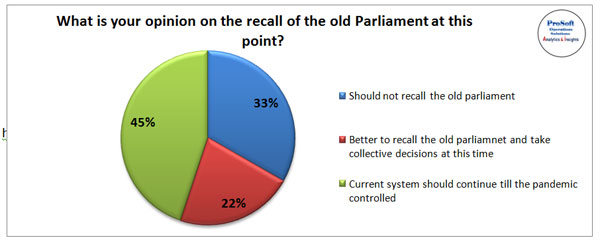
With respect to this question, if you combine the 33% who say that there is no need to recall the old parliament that has been dissolved in March and the 45% who say that the current system should continue (which is the Executive President running the government with a transitional cabinet of ministers), it is clear the majority of 78% believe that there is no need for the old parliament be recalled.
Both the above responses clearly show that the people are not interested in politics at this time and it is upto the leaders to figure out a way to govern the country without disrupting the lives of the people who are already battered by the pandemic’s economic impact. This opinion and mood of the people could also be a result of the fact that there is a very high satisfaction level with the way the current government led by the President (88% satisfaction) and supported by the frontline workers of the health sector (96% satisfaction) and the military (97% satisfaction) is handling the situation.
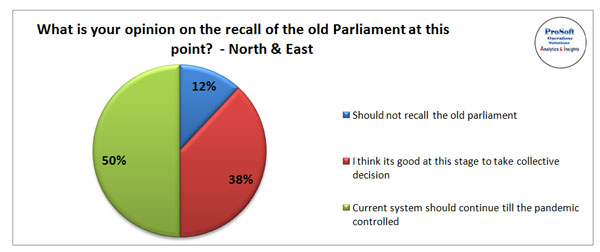
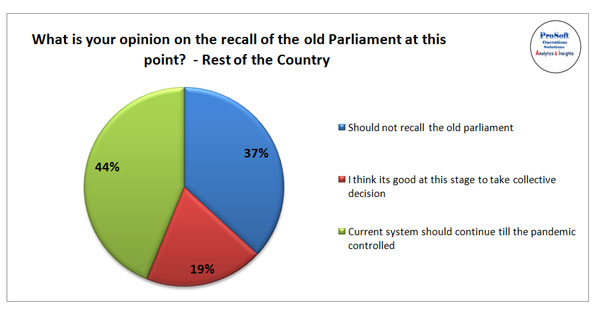
Satisfaction with the Performance of the Government Mechanisms of Controlling Covid 19
How satisfied are you with the following parties and their contribution during last 7 weeks to prevent /
control the spread of Corona virus in Sri Lanka?
(Results at National Level)
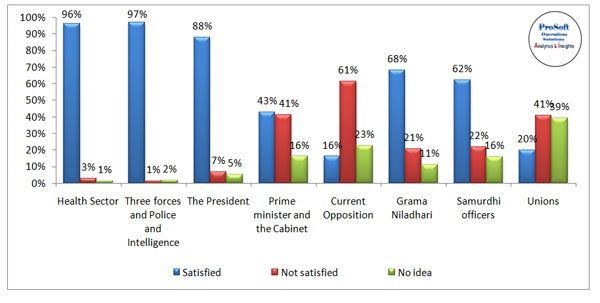
Satisfaction with the Performance of the Government Mechanisms of Controlling Covid 19:
How satisfied are you with the following parties and their contribution during last 7 weeks to prevent /control the spread of Corona virus in Sri Lanka?
Results: North & East Provinces
